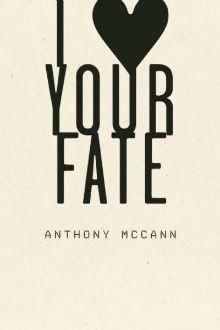
The poem "Putin With Lynch" in Anthony McCann's book I ♥ Your Fate (Wave Books, 2011) functions, to my mind, as an ars poetica, offering readers some sense of how to read the collection:
But there's a parallel world attached to this world
Which are these paths drawn thinly down through the woods
And I meet you there now under the bridge
Which are these paths drawn thinly down through the woods
And I meet you there now under the bridge
Where we hear the snow sing snow songs to itself (21)
McCann's poems, indeed, are parallel worlds where "the snow sing snow songs," which in turn allow us, through the confluence of sound and the imagination (i.e. the acoustic-image), to sing our own songs while reading each of them. "But there's a parallel world there under the snow," and in the parallel world below the world parallel to our world, there is "grass thinking snow thinking snow thinking snow" (21): a thought below worlds of song twice removed.
Perhaps the most compelling actualization of this idea poetic-concept-world occurs in the poem "In the Visitors' Locker Room." The poem begins:
Now imagine the vaginaPicture the unfolding of theButtery vulvaPicture the swollen wrinkly lipsThe shiny pulsing clit (60)
There is the world of the reader (and writer), then there is the world parallel to that world in the poem and it's filled with an "unfolding... / Buttery vulva." The worlds stimulate a vision within the reader's mind: specific, clear, and isolated. But it is also a world attuned to (vagina) song in the internal rhyming of "imagine" and "vagina" and the half rhyme of "lips" and "clit," as well as the assonance of "Picture...wrinkly lips / ...shiny...clit." But, once in this world, we are asked to go elsewhere into another world:
And then picture the worldA parking lotIn the desertWindThe rumble and rattle of trafficThe day's last lightDarkness settlingOver the pumpsYou are a travelerYou are enteringThe glass cubeOf this Chevron station (60-61)
The abrupt shift between worlds is made all the more drastic through the juxtaposition of two disparate images: the close-up of a vagina contrasted against the desolate but panoramic Chevron station and its "parking lot / In the desert." The other shift, of course, is that the reader (i.e. "You") has enter the poem world; no longer a disembodied sexual organ, we now see ourselves actively participating:
Your hand is on the door handleYou are pulling open the doorThe little bell is jinglingAnd you remember nothing elseNot where you are fromNor where you are going (61)
This world, then, becomes so focused and so all-consuming that we no longer remember where we are from or where we are going. Likewise, the fact that our actions are so simple, contain such basic imagery, and are relatively innocuous enable most readers in the modernized world to connect with them. And just as we're settling into this new, banal, precise-but-less-than-overwhelming world:
So that this wonderful vaginaHas become even more appealingAnd you can touch it with your noseAnd you can wiggle your nose in itAnd then you can kiss it (61)
We return to the vagina, but this time we are going down on it. One would assume, given the claim that we "remember nothing else" beside the Chevron station in a desert, the poem is having a bit of fun at our expense, or at least pulling us out of our modern petrol reverie and reminding us of our sexual longings; but moreover, reminding us that even while we're deep within one world, there is a parallel world existing alongside it, whether we think of it or not. And that world is filled with the repetitive songs of an "And you can" anaphora. But, yes, the worlds shift again:
Meanwhile in the worldA scraggly little animal passesIt scurries through the lotAll dust and twigs (62)
And then, another world within an already other world:
And on televisionThe one over the gas pumpsKobe BryantIs talking about his fatherHe is speaking very slowly (62)
And then worlds begin to intersect and revelations present themselves to us:
And you listen very carefullyWhich is when you learnThat the most important thingin this gameis to winthis gameAnd that thisKobe BryantHas never forgotten (62)
We figure that that game Kobe Bryant refers to is basketball, but what game must we win? And why has Kobe "never forgotten" this, but we can "remember nothing else" besides our hands pulling a door handle and little bells jingling? Why all these worlds? Not surprisingly, we are told:
Now you feel very confusedYou will try to remember your own father (63)
But in this confusion [1], which includes a switch to the future tense, we have very little time to think of our fathers. Instead, we return to the desert parking lot:
As the animal disappearsin the scrub brushbeyond the dumpstersand in the skya kind of gloamingis happeningBut you don't remember the wordand you would never say gloaming (63)
And now we know that the "You" of this poem, or at least the "You" of this parallel poem-world, might not actually be us because these words in this world we've never known and never care to use. You are not "You"; "You" is someone else that may or may not resemble you, but we are in the world and looking through "You's" eyes nonetheless. In all this confusion, then, we return to what we've seen most clearly and what we've longed to see once again, primal, clear, and lasting:
And you think again of the vaginaThe marvelous vaginaThe wrinkled bloom of the labiaThe mute pulse of the clitThe night is not a mirrorThis night is not the VoidIt's a wonderful vaginaYou've been standing here for years (63)
[1] It should also be noted, although formatting for Blogger makes it difficult, that the Kobe Bryant section is scattered about the page in a field/organic form, further maximizing the confusion.

No comments:
Post a Comment